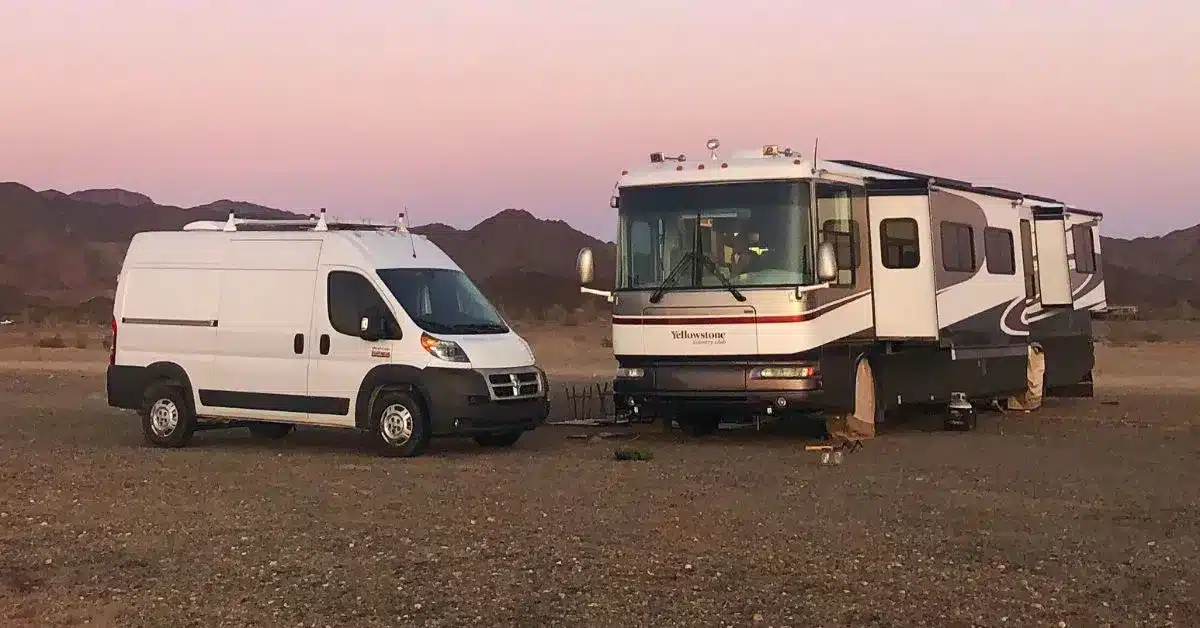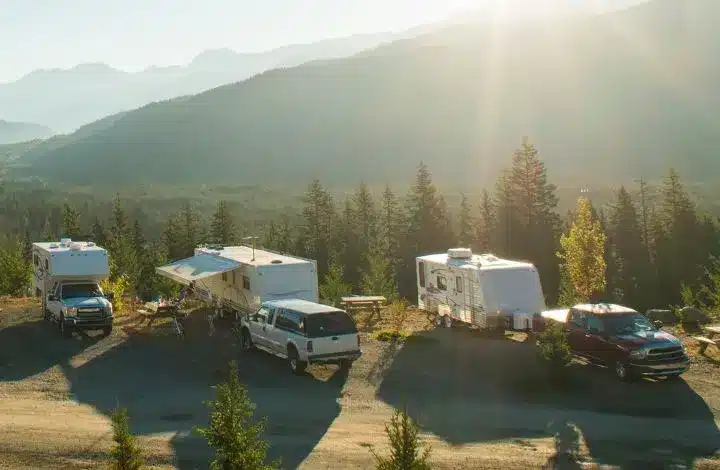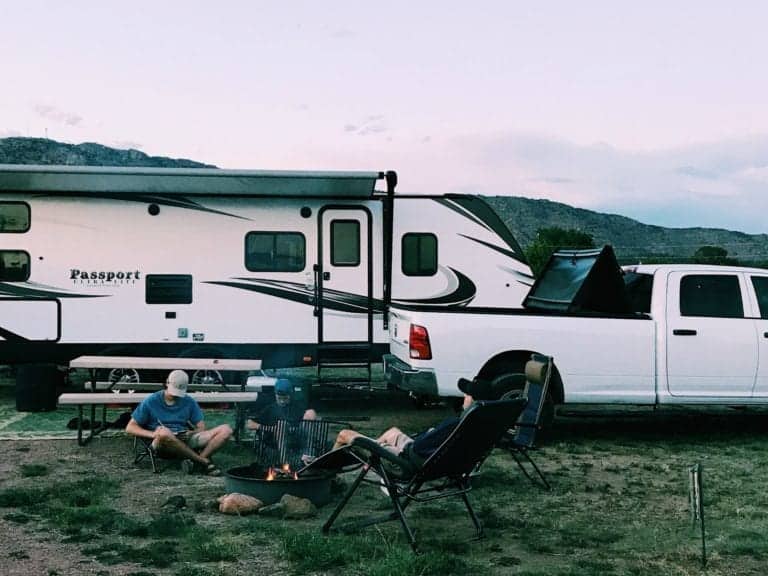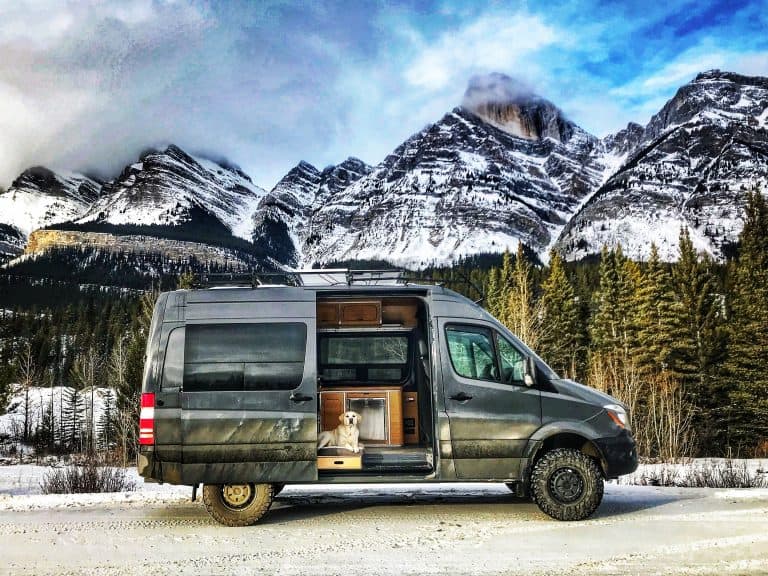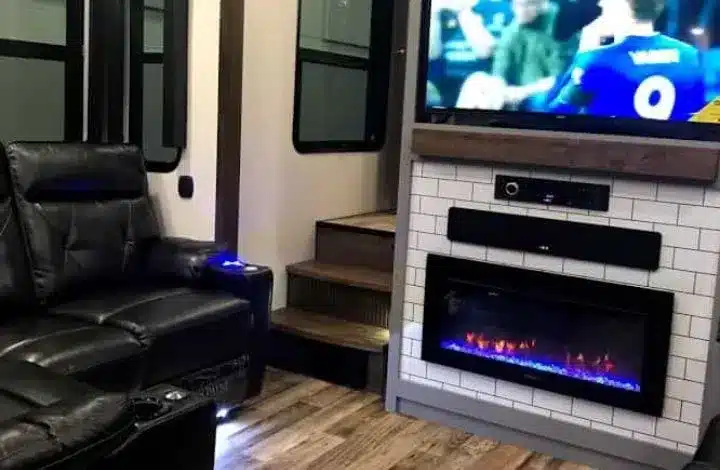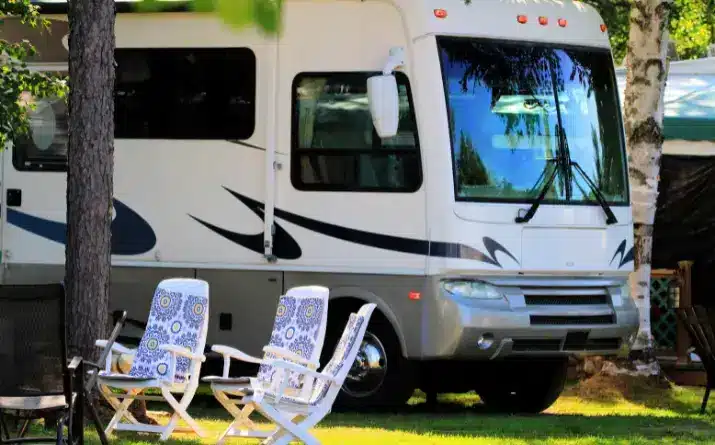Pros and Cons of RV vs. Van Life: Which is Better?
When I met the man who is now my husband, I was living full-time in a travel trailer at an RV park. At that time, he lived in an apartment and owned a self-built campervan that he used to venture off into the woods. When we decided to move in together, we bought a Class A motorhome as our primary residence. We kept the campervan for weekend adventures. Needless to say, we know a lot about the pros and cons of RV life vs. Van life.
Having owned and lived in a travel trailer, a large RV, and a campervan, I have a lot of personal experience on the road. My husband and I are often asked questions about this nomadic RV lifestyle. Most of the questions center around budgets, savings, travel destinations, and which type of vehicle is best.
Guidance and Tips Based on Experience
That’s why I wrote this article. I want to offer you some guidance based on my many years of experience with recreational vehicles. By the end, you should have a good sense of both full-time RVing in large vehicles as well as tiny living in the small space of a campervan.
Let’s start with a general summary of the pros and cons of RVs vs. Campervans. Then read on for more detail and examples from my own first-hand experiences.
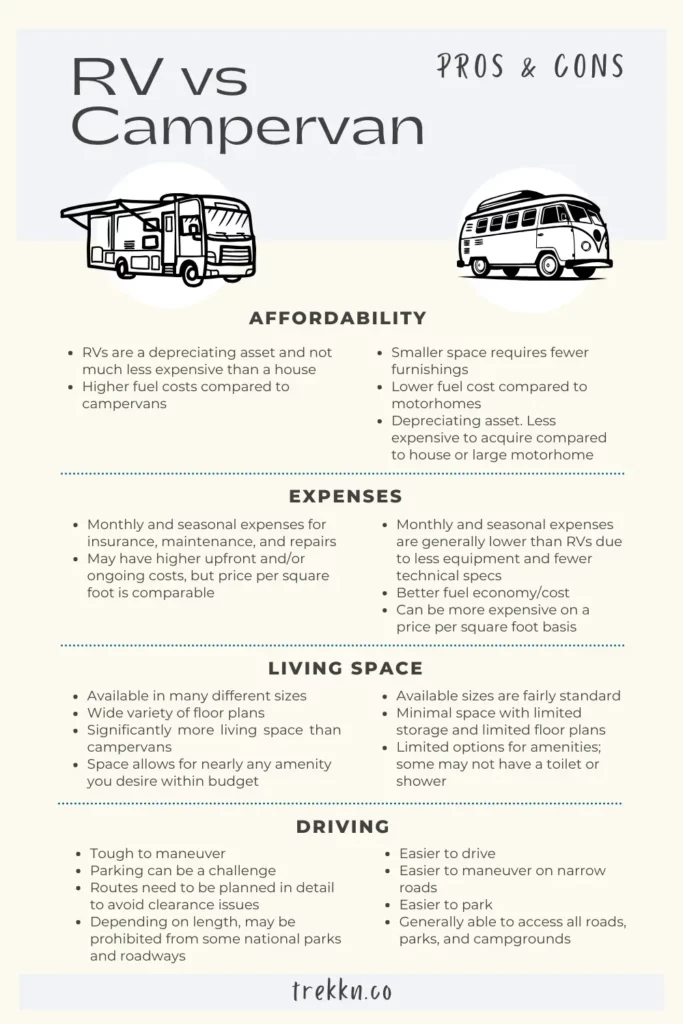
Summary of the Pros and Cons of RV Life vs Campervan Life
Pros and Cons
Here is a quick summary of the pros and cons of RV Life vs Van Life.
AFFORDABILITY
RV
CAMPERVAN
EXPENSES AND SAVING MONEY
RV
CAMPERVAN
LIVING SPACE
RV
CAMPERVAN
Weighing the Pros and Cons of Campervan Life vs RV Life
At the end of the day, whether or not an RV or a campervan is a good idea for you depends on your personal lifestyle.
A Quick Step Back to Assess Your Personal Needs
It might be best at this point to take a brief step back to think about your general reasons for contemplating a life on the road. When considering a major decision, jotting down the pros and cons can provide a constructive way to think it through.
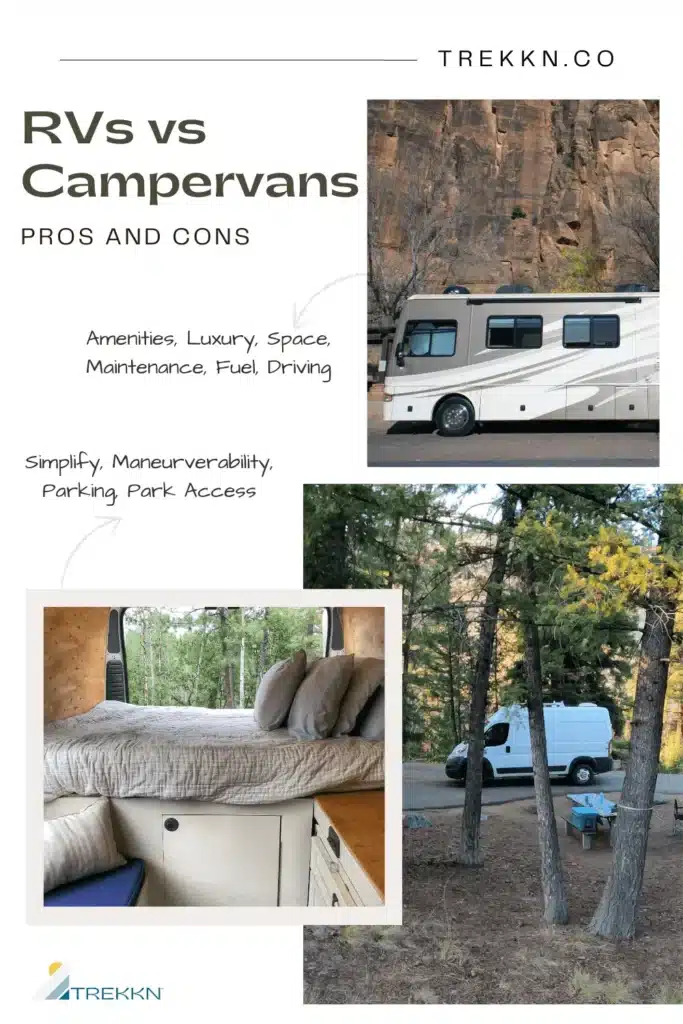
In this instance, you may want to separate the important things from the superfluous ones. For example, ask yourself why you’re considering a life on the road. And whatever the reason – whether it’s attempting to cut costs or experience more outdoor adventures – ask again, why.
This time, ask specifically about the answer you just provided. Why do you need to cut costs? If the answer to that question is because you just got laid off, then jumping to a life on the open road may not be the best solution. (Or, maybe it’s the perfect time for you!)
Understand the core reason you may want to live a full time nomadic life.
The point is, dig deep and really get to the core reason a nomadic lifestyle feels like a good fit for you. With that answer in hand, you will have greater clarity to determine whether the pros and cons of RV or Van life apply to your situation.
I’ll do my best to address the questions people ask most often when they’re considering a life on the open road. You can decide which ones are priorities for you then make the best decision for your specific needs.
Finding the right vehicle is important and will help to ensure you enjoy mobile living. It’s best to do your research and make an informed decision (which you’re doing now!). But also remember, you can always change rigs if you discover something isn’t working out.
Which is More Affordable: an RV or a Van?
First Consideration: House or Motorhome?
For those of you on a tight budget, living in a smaller space that requires fewer fixtures and furnishings may help ease your biggest concerns. However, when asked if a nomadic lifestyle can be done on the cheap, I inform those hopeful van lifers that it’s generally not much less expensive than living in a sticks-and-bricks home.
Real Estate Appreciation and Ongoing Expenses
If you want to avoid carrying a high debt balance, then yes more people have enough cash to buy a van than a house. But, vehicles depreciate almost immediately after driving off the lot. Real estate, on the other hand, generally increases in value over time.
You should take that appreciation into account when thinking about the financial aspects of this decision. Moreover, when comparing the costs of living in a traditional home to the expense of a full-time RV life, include all the ongoing annual expenses.
In both situations, you will incur expenses for maintenance, repairs, insurance, and tax.
Specific Considerations for a Mobile Life
Don’t forget to include furnishings and comfort items. You can take a few items into the RV, but plan on incurring new costs to buy some appropriate sized household items that fit in a small space.
Also, when downsizing to a motorhome, you may incur monthly fees for a storage area. Unless you’re really good at purging, you’ll need a place for all your belongings that will be left behind.
There are, of course, additional considerations specific to the type of RV you buy. If you’re in the market for a travel trailer, for example, you will need to ensure you have an appropriate tow vehicle that can pull the weight. Also ensure that both truck and trailer have high quality tires to reduce roadside issues.
Create a Realistic, Practical Budget
At this stage, try to exclude emotions. For example, don’t let the reasons you’re considering a nomadic life and the dreams of travel get in the way of the numbers. Emotions can muddy the data waters.
Remove personal dreams from your budget analysis and your cost of living comparison will be a more in-depth and accurate estimate. After you have a detailed view of your estimated monthly expenses, you can start to dig deeper and make decisions about cutting back on certain comforts of home, if needed. Then you will be able to compare the projected expenses with your expected income.
Only you can know what is right for your financial circumstances. When thinking about purchasing an RV or a camper van, there are a few key items to include in your budget.
Check this list of 50+ RV Accessories You’ll Need
Is a Nomadic LifXestyle Affordable?
My husband and I initially managed our RV life on a budget to get out of debt and pay off our student loans. We also had a savings goal earmarked for buying a house.
Of course, we got hooked on the mobile lifestyle. So although we now own a house, we still own an RV. Given our love of the outdoors and travel, you may not be surprised to learn we also search online daily for a new campervan.
Key Tip for Full-Time RVers to Save Money
A great way to pinch pennies while living and traveling in an RV is to spend more time in one spot. Many new RVers who are excited about sightseeing and visiting national parks and monuments all across the United States follow an aggressive travel schedule.
Doing so increases fuel costs and campground fees. It can also increase food waste as you ramp the frequency of setting up and breaking down camp. Moreover, higher drive time increases wear and tear on your rig that may result in higher annual maintenance expenses.
Reduce the number of travel days and, all else being equal, you will reduce your costs.
Living in an RV Full-Time: The Luxe Option
RV life can also be done very expensively. To start with, RVs and campervans themselves can be very expensive. There are luxury motorcoach resorts that cost more per night than a nice hotel. Any interest in a quick ooh and aahh moment?
Take a quick peek at the VarioMobil Perfect. It is a custom made motorhome built on a truck and bus chassis from Mercedes-Benz and MAN. It includes up to three bay windows and comes complete with a garage for your car. No, that’s not a typo.
Related Reading: Luxury RVs You Have to See to Believe
Do RV Owners Save More than Home Owners?
So, is it cheaper to live in a van or an RV, compared to living in a traditional house? It can be. All in all, it comes down to managing your choices and budget. That applies whether you live in a house or a motorhome. In most cases, when the comparison is apples to apples, one option is not much more or less expensive than the other.
On the other hand if the move is a significant downsize from one home to another, then you are more likely to realize the savings.
Let’s dive a little deeper into this topic with a comparison between camper van life and RV life.
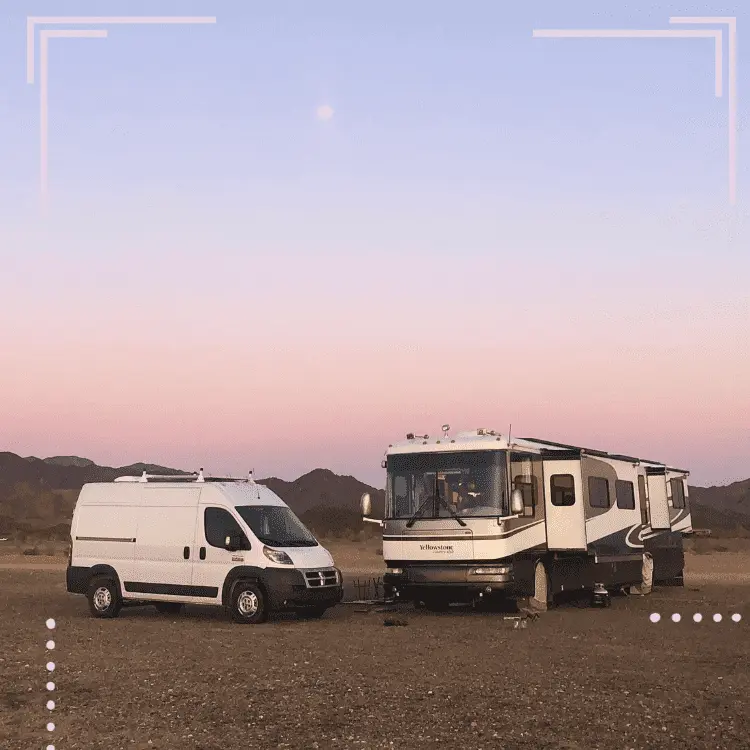
Is Van Life Cheaper than RV Living?
It depends. Our campervan was originally a commercial van. We bought it as an empty shell. It was less than one year old with only a few thousand miles on it. The price tag was $40,000 before accounting for the costs to build it out into a mobile home.
Buying a Class A Motorhome
By comparison, our Class A motorhome was 15 years old when we purchased it from a private party. The purchase price was $39,000.
It was loaded with luxury amenities, including TVs, a bathtub, central vac, leather couches. And it required no build out or conversion costs. It was ready to roll the day we bought it.
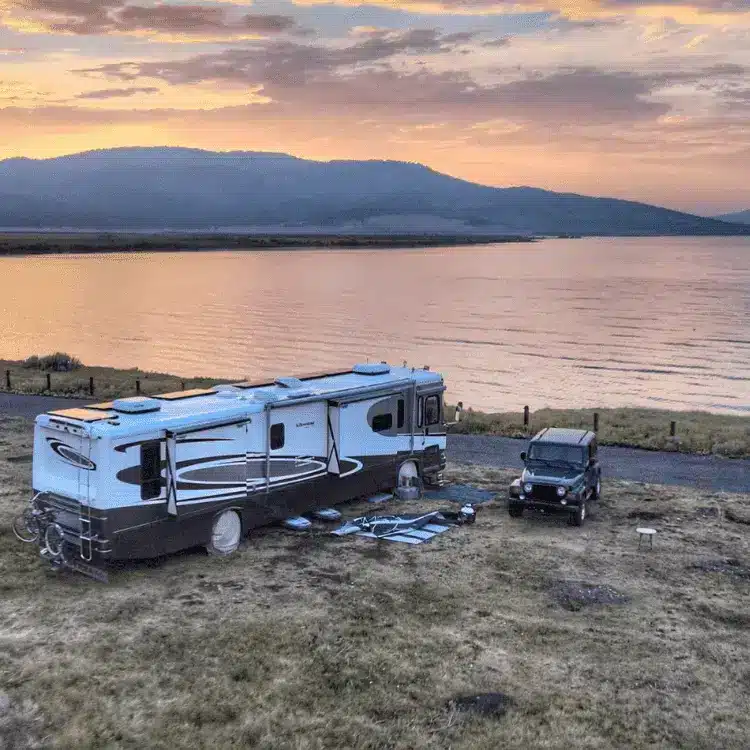
Is a Campervan Worth the Cost?
Today, campervans can cost over $100,000. For the price per square foot, I’m not sure those fancy build-outs are worth it. Of course, there are brand new RVs with an MSRP in the high six figure range.
For us, we think we get more value out of the money we spend on our motorhome. And as we look for a new campervan, we are not looking for a manufacturer’s build-out.
Include All Potential Expenses in Budget Comparison
As I mentioned earlier, when calculating your budget for a move to mobile living, consider the costs beyond the initial purchase price. Account for monthly and seasonal maintenance, insurance, camping fees, and fuel. If your budget is a priority, consider that campervans tend to consume less fuel than RVs or tow vehicles.
When it comes to creating a complete budget, the type of RV is an important consideration. Because vans have great fuel economy compared to a large motorhome, they are a more affordable option, all else being equal. The trade-off of course is the limited space.
That brings us to our next main topic. When you consider nomadic life compared to a stationary house life, the biggest difference is space.
How Much Space Do I Really Need?
This is one of those questions that elicit dozens upon dozens of various answers. The truth is the answer is subjective and dependent on your personal preference and individual needs.
Is it just you traveling solo in your home on wheels? Or do you travel with kids, pets, and toys in tow? Whether you choose a van or an RV, you will significantly reduce your livable square feet. Spending a lot of time in a small, mobile home forces you to simplify your life and cut back on creature comforts.
That said, there are definitely ways to improve the available space within any motor home. Organization is key and there are a lot of design options that can help.
Related Reading:
If Space is a Priority, Consider an RV
The amount of storage and living space you’ll have is one of the biggest differences between a van and an RV. RVs can vary greatly in size from 20 feet to 45 feet, but in general, any RV you choose is going to provide more space and comfort compared to a van.
In an RV you’ll likely have a full kitchen, a bathroom, and even a dedicated sleeping space. These are all luxuries that you rarely, if ever, find in a campervan.
RVs are designed with more space and provide greater comfort than a van
Van life can be tough on relationships as the close quarters don’t allow for much personal space or privacy. In addition, RVs have more storage space. You can bring more items, from books and personal care amenities to bikes and outdoor gear, that help make life on the road more comfortable. If space is a priority, choosing an RV will probably be right for you.
Pros and Cons of Driving RVs vs Campervans
Many travelers choose a campervan for the freedom and mobility of having a tiny home on wheels. There’s no arguing this one, a campervan is easier to drive than any RV. Especially in congested areas or on narrow roads, RVs are more challenging to drive. The compact size of a campervan allows the ultimate in maneuverability.
Maneuverability: Campervans are easier to drive than any RV.
Driving a large motorhome is one thing. Maneuvering it through a parking lot is a whole different ball game.
Parking a Campervan is Easier
Most campervans fit in a regular parking space and thus take very little training to drive or park. RVs on the other hand, can be challenging to fit or park at small campsites. Campervans can quite literally park anywhere and are far more stealthy when needed.
In a Campervan, You Have Access to More Parks
Depending on the size of your RV, there may be destinations, national parks, and entire roadways that are off-limits to your rig. This is not an issue you will encounter with a campervan.
So, if the ability to go anywhere and ease of operation are your top priorities, a campervan might be a good fit for you.
How Do Amenities in Campervans Compare to RVs?
Most modern RVs come with pretty luxe amenities. You can relax in style with air conditioning, heating, multiple TVs, and comfortable furnishing. If you want a residential refrigerator, an RV is your only option.
If you want an oven to cook regular meals, you’re probably leaning toward an RV. Our Class A motorhome even has a washer-dryer combo and a bathtub! We are not exactly roughing it out here on the open road, folks.
Luxury and Comfort: For a luxe life on the open road, RVs are the winner.
Due to the DIY nature of many van builds, it’s difficult to create a general list of standard amenities. Most vans will have a bed, a sink, a cooktop, and some sort of entertainment setup. However, there isn’t much room inside a van. Many conveniences you normally use on a daily basis, such as a toilet, a shower, or a fridge will not be included.
If using public restrooms or a compositing toilet and skipping hot showers are deal breakers, then a camper van is probably not the best option for you.
RVs are a better fit for travelers who want amenities that are similar to what they’re used to in a house.
Who Enjoys the Outdoors More: RVers or Van Lifers?
It’s tough to compare whether one option or the other leads to more quality time in the great outdoors. Even for someone like me who has first-hand experience living in both types of motorhomes, it’s still a toss-up.
Campervans: More Time Outdoors, but Increased Exposure to the Elements
A campervan has limited indoor space, so it’s going to force you to spend more time outside. That’s a good thing if your objective is to live a life enjoying outdoor adventures. A quality campervan (especially with 4WD) can take you further into the backcountry and closer to nature.
That said, living in a van also means you endure greater exposure to the elements. Unfortunately, extreme weather like endless rain, strong winds, or dust storms can make van life uncomfortable.
RVs: Interior Comfort May Bring Greater Enjoyment of the Outdoors
On the flip side, an RV has more interior space to spread out when you need to be inside. Whether you just need a day out of the sun, or it’s snowing outside, an RV provides a comfortable shelter. For me, this means I can enjoy living in the great outdoors longer because I can have a break when I need it.
The jury is still out on this one. I’m not sure if there are any advantages to living in a van or an RV when it comes to enjoying nature. Perhaps the underlying factor is neither the means of transportation nor the living quarters, but rather our individual ambitions and interest in getting outdoors to explore the natural environment.
Are You Ready for a Nomadic Lifestyle?
I have one last consideration that applies whether you choose a van or an RV. Expect to have a significant amount of uncertainty in your new mobile life. Ask yourself if you need to have roots, to have a specific area you like to call home. If you value a stable, predictable lifestyle, then it’s unlikely that a mobile, on-the-go life will be a good fit for you.
Maintaining Relationships on the Road
It can be challenging to maintain relationships and connections. Sometimes it feels as if you’re always in the process of meeting new people and making new friends.
Even though you’re home, comfortable in your RV, you are frequently staying in new places. So each time you setup camp, you need to refresh your search for local stores, gas stations, and other resources. Even booking a dentist appointment can be a challenge when you’re living a nomadic lifestyle.
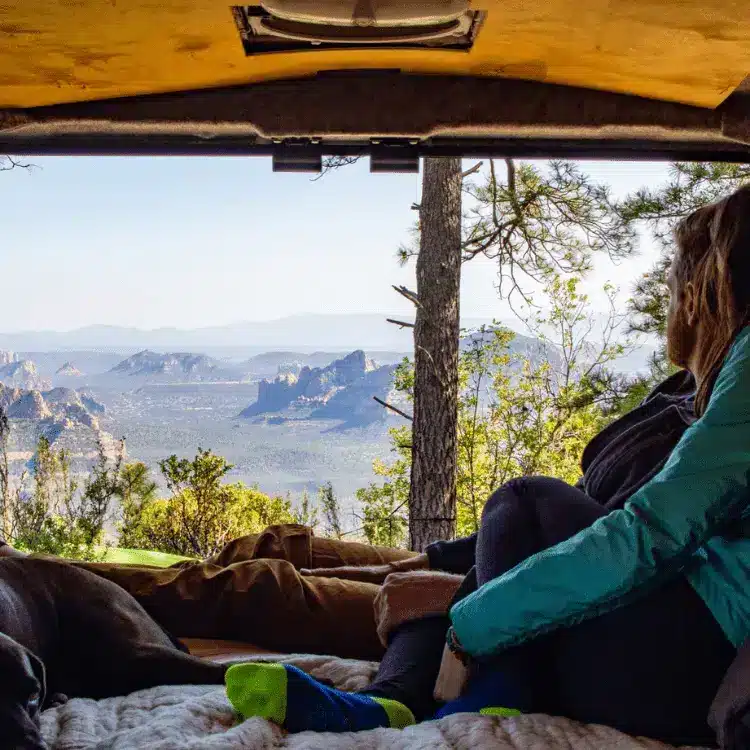
Comparison of the Pros and Cons of RV Life vs. Van Life
In summary, RVs offer more space and comfort but come with higher costs and less maneuverability. Vans are more budget-friendly and versatile for exploring anywhere you can imagine, but they come with space limitations and fewer amenities.
Consider where you wish to travel, your budget, and space requirements carefully. Then just make the best decision you can. Both options offer the incredible freedom and adventure of life on the road.
Whichever you choose, remember it’s the journey, not the destination, that matters in the end.
What is Your Choice: Campervan or RV?
We always love hearing from our readers. Let us know what you think. Is your top choice a Campervan or RV?
Related Reading:
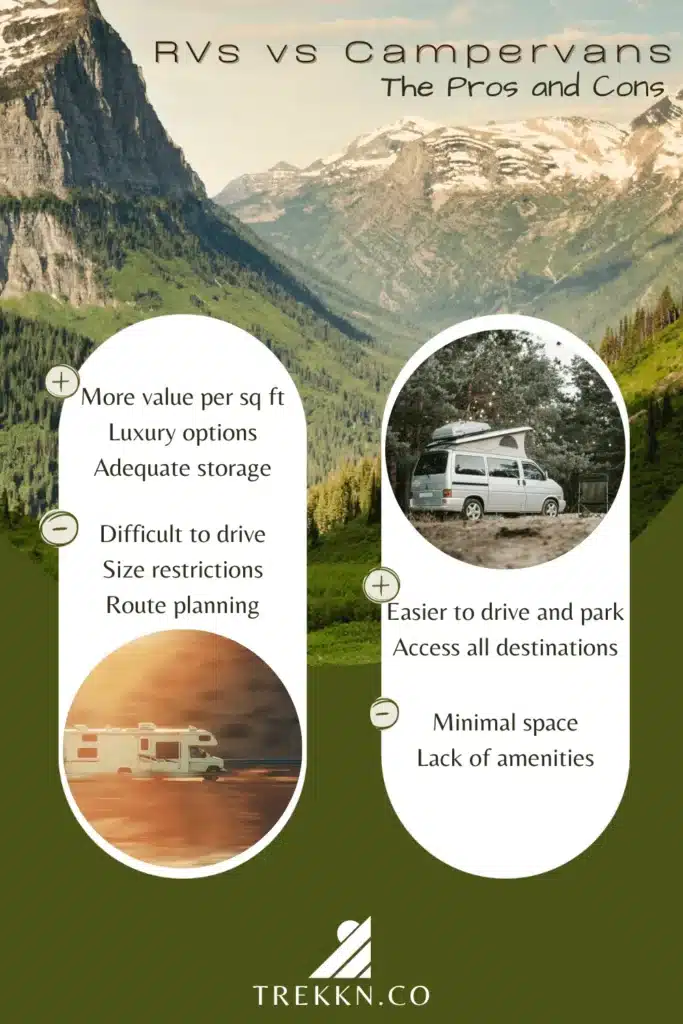

Kristen Bates lives & works from her RV, primarily boondocking off-grid. She owns and operates a women-led travel company, Legit Trips. Kristen loves to explore new places and inspire others to do the same. If she’s not typing away on her laptop, she’s off on an adventure- hiking, biking, or SUP boarding. You can follow her RV adventures @PerpetualMoves and learn more about her travel company at LegitTrips.com.


